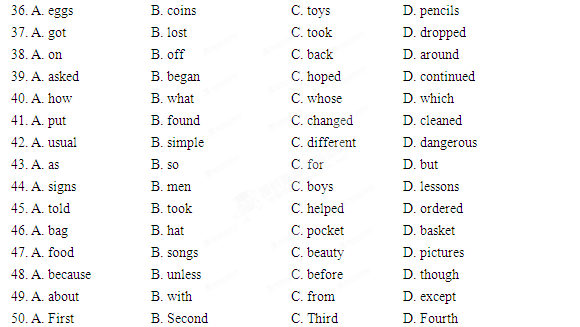
| 小题1: |
|
| 小题2: |
|
| 小题3: |
|
| 小题4: |
|
| 小题5: |
|
| 小题6: |
|
| 小题7: |
|
| 小题8: |
|
| 小题9: |
|
| 小题10: |
|


科目:初中英语 来源:不详 题型:阅读理解
查看答案和解析>>
科目:初中英语 来源:不详 题型:阅读理解
| A.you say something kind to others | B.you help others |
| C.someone helps you | D.you need others to help you |
| A.Only American people | B.All the people except American |
| C.People in many countries | D.Few people outside China |
| A.Thank you. | B.Excuse me. |
| C.How about yours? | D.I’m very sorry. |
| A.cough | B.make some noise |
| C.go first | D.all of the above |
| A.to be happy | B.to be polite |
| C.to help others | D.to learn from Americans |
查看答案和解析>>
科目:初中英语 来源:不详 题型:阅读理解
| A.old newspaper | B.sweets or a cake | C.some money | D.stories |
| A.the customers got their newspapers late |
| B.Grandpa began to tell him about his boyhood |
| C.he saw grandpa feeling lonely |
| D.Grandpa asked him about the things he was doing |
| A.Bob was still a child | B.Grandpa liked to tell stories |
| C.the customers sometimes got angry | D.lonely people need other people |
查看答案和解析>>
科目:初中英语 来源:不详 题型:阅读理解
| A.To catch the butterfly easily. |
| B.To play with the butterfly. |
| C.To help the butterfly come out. |
| D.To make the butterfly stronger. |
| A.It died soon. |
| B.It had a strong body and wings. |
| C.It could fly after a few days. |
| D.It couldn’t fly during the rest of its life. |
| A.it got out of its cocoon without struggle |
| B.nobody had taught it to fly |
| C.all newborn butterflies could not fly |
| D.the man broke its wings |
| A.Kindness in our lives can help us grow. |
| B.Try to be ready to help others. |
| C.Without other’s help we can still succeed. |
| D.Hard work leads to success. |
| A.The Old Man and the Butterfly | B.Life Struggle |
| C.How To Help a Butterfly Fly | D.Kindness and Rush |
查看答案和解析>>
科目:初中英语 来源:不详 题型:阅读理解
| A.the hotel | B.his home | C.the park | D.the car |
| A.waited for the rich man |
| B.looked at the rich man's hotel |
| C.looked at the rich man's car |
| D.enjoyed the clean air |
| A.sleeping in that hotel |
| B.becoming rich |
| C.owning that hotel |
| D.being the rich man's friend |
| A.he didn't want to live in such a fine room |
| B.he didn't like the rich man |
| C.he couldn't pay for the room |
| D.he couldn't get any sleep at all there |
查看答案和解析>>
科目:初中英语 来源:不详 题型:阅读理解
| A.two | B.three | C.four | D.five |
| A.Clark | B.David | C.Sonia | D.Paul |
| A.完全地 | B.渐渐地 | C.理性地 | D.一致地 |
| A.policeman | B.doctor | C.actor(演员) | D.reporter(记者) |
查看答案和解析>>
科目:初中英语 来源:不详 题型:完形填空
查看答案和解析>>
科目:初中英语 来源:不详 题型:完形填空

查看答案和解析>>
湖北省互联网违法和不良信息举报平台 | 网上有害信息举报专区 | 电信诈骗举报专区 | 涉历史虚无主义有害信息举报专区 | 涉企侵权举报专区
违法和不良信息举报电话:027-86699610 举报邮箱:58377363@163.com